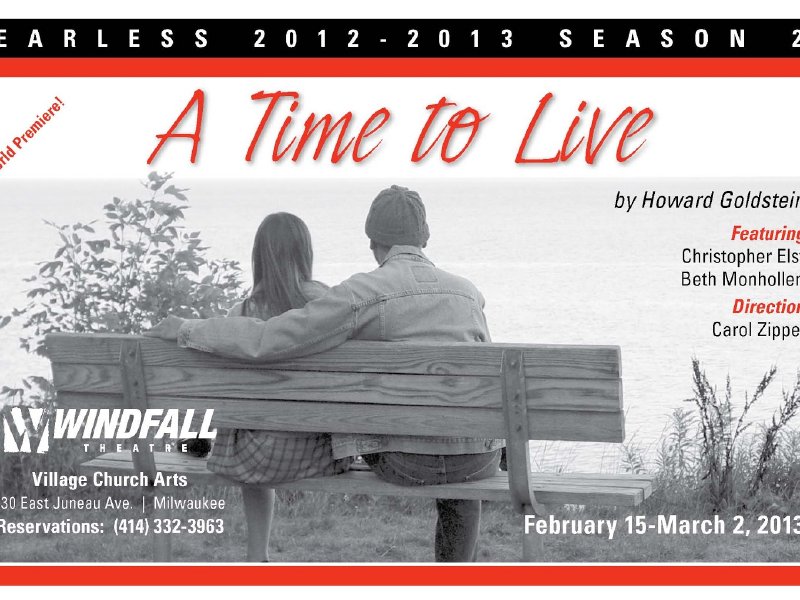In one major respect, "A Time to Live" - written by local playwright Howard Goldstein and underway at Windfall Theatre - is a lot like the movie "Titanic."
In the film we all knew how it was going to end. We just kept waiting around for the damn boat to sink.
In the play, we also knew how it was going to end. We just kept waiting around for Maddy to die.
Maddy, played by Beth Monhollen, is married to Richard, Christopher Elst. She’s a doctor, he’s a professor. She has cancer and has decided to stop medical treatment and live the last days/weeks/months of her life as she wants.
For anyone who has ever lived through the final period of life with someone who is dying with cancer, you know what to expect. A lot of emotion. Highs, lows. More lows than highs. Bursts of anger, lots of sadness. The one thing missing is hope.
There are no surprises in the situation. Nobody ever goes, "Holy Cow! What a shock."
And that’s the problem with this play. There is no surprise once we know, from the very first moments, that Maddy is headed to an early death. Getting her there is kind of a thin journey, played almost always on an even keel.
There is really no new ground broken here. Too much of it is stuff we’ve heard before.
At a fall picnic when they are outside briefly, Richard looks at Maddy and declares that "your eyes look like two suns."
Maddy, explaining her second marriage, this one to Richard, declares that "this time I got it right." A card for Maddy’s surprise birthday party that says "...you are showing us all not only how to live, but how to die." Maddy looks at Richard, forlorn, and says, "This is my last birthday, Richard."
Cue the violins.
This play needed a lot more workshopping than it apparently got in its almost 14 years of life. It doesn’t do anything to grab you.
The dialogue is stilted and doesn’t sound at all the way real people talk. And the play uses one of the most obnoxious tactics I see in occasional plays: the actors turn to the audience and talk directly to them. No matter what has gone on before, what happens then is we start to think of the people on stage as actors, not characters.
It’s a strategy employed when a playwright can’t find a way to move a story with dialogue and interaction between the characters. And it is used to fill in background and things that the playwright thinks we should know. But it confuses me by taking the characters out of their world and putting them into mine.
Richard is a runner and his path takes him along Lake Michigan. When he returns, he tells Maddy about the run. Sometimes he forgets to mention the lake.
"You must always tell me about the lake," she says in her final days. And, lo and behold, she dies in her bed, and Richard, after checking her neck and wrist for a pulse, sits on the floor next to the bed, holding her hand and, guess what? He tells her about the lake.
There is potential to develop a real good play around this idea. But this one missed its mark.
For more information on "A Time to Live," visit windfalltheatre.com.
With a history in Milwaukee stretching back decades, Dave tries to bring a unique perspective to his writing, whether it's sports, politics, theater or any other issue.
He's seen Milwaukee grow, suffer pangs of growth, strive for success and has been involved in many efforts to both shape and re-shape the city. He's a happy man, now that he's quit playing golf, and enjoys music, his children and grandchildren and the myriad of sports in this state. He loves great food and hates bullies and people who think they are smarter than everyone else.
This whole Internet thing continues to baffle him, but he's willing to play the game as long as OnMilwaukee.com keeps lending him a helping hand. He is constantly amazed that just a few dedicated people can provide so much news and information to a hungry public.
Despite some opinions to the contrary, Dave likes most stuff. But he is a skeptic who constantly wonders about the world around him. So many questions, so few answers.







